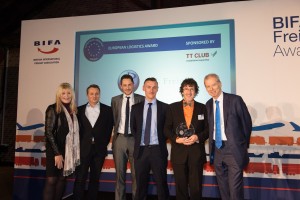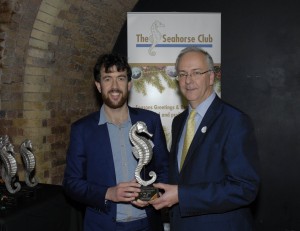Industry sentiment expressed at the ICHCA Seminar entitled ‘SOLAS VGM One Month Out – Are You Ready?’ held in Antwerp last week, was one of frustration. Less than 15% of the IMO Member States in which VGM regulations will be mandatory have issued guidelines on the manner in which they intend to enforce the regulation.
London, 8 June, 2016
With under a month to go before the amendments to the International Convention for the Safety of Lives at Sea (SOLAS), requiring that shippers obtain the verified gross mass (VGM) for each packed container and communicate it to the shipping line before it can be loaded onto a ship representatives of a wide spectrum of the industry gathered to review preparedness.
The recent IMO Circular, issued on 23rd May and urging ‘practical and pragmatic’ approach to enforcement of VGM over the first three-month settling-in period, was welcomed. Albeit in the context that further national implementing measures may not be required, it was noted that less than 15% of the 162 IMO Member States that are signatories to SOLAS have given shippers and operators in their jurisdiction any helpful guidelines regarding VGM procedures that become mandatory on 1 July.
Mike Yarwood, Claims Manager from TT Club, the freight insurance specialist addressing the Seminar audience commented, “The recent IMO Circular is rightly good news for those that are taking appropriate steps to prepare for 1st July. It is not – and should not be considered in any way – a panacea for the unprepared. Sympathetic enforcement for a limited period allowing for cargo already in the supply chain and resolution of teething problems in no way steps away from the safety objectives of these VGM amendments.” TT Club has repeatedly pointed out that there was extensive stakeholder and international consultation leading to IMO’s adoption of the amendments to SOLAS in November 2014.
The recent Maritime Safety Committee Meeting stated that the key to successful implementation of the VGM requirements is close communication and cooperation between governments and all industry stakeholders. It was also recognised that the
VGM requirements operate within a context of cargo related requirements in SOLAS, the ISM Code[1], the IMDG Code[2] and the CTU Code[3]. Mike Yarwood summed this up,
“Behavioural change through all aspects of the supply chain is required. Weight is a relatively small element of broader initiatives to engender safety and improve operational performance. Improved stakeholder communication is foundational.”
The Antwerp Seminar was a recent element of a long-running effort by ICHCA and a number of trade bodies to create a greater awareness and understanding of the VGM regulation. Captain Richard Brough, Technical Advisor to ICHCA International has, along with others, been at the forefront in this challenge. Speaking at the Seminar, he said, “As 1st July approaches we see an increasing number of terminal operators announcing the service options they will offer to shippers to facilitate determining the VGM of export containers. Lifting equipment suppliers, carriers, forwarders and, with a few exceptions, shipper representatives have all engaged positively in order to identify the most appropriate way to comply, whether by Method 1 or Method 2. Sadly, where compliance is a shared responsibility, communication between all the different parties has too often been acrimonious rather than collaborative. As a result – a month out – contingency planning is now crucial for all stakeholders, to avoid a potentially disastrous impact on container supply chains.”
Both ICHCA and TT Club, together with the World Shipping Council (WSC) and the Global Shippers Forum (GSF) are determined to use the remaining weeks to continue their mission of education to those concerned with, and about, the regulation. These four sponsors will shortly issue ‘Verified Gross Mass – Supplementary Industry FAQs’ to add to the document released in December 2015. The organisations will also monitor implementation, both in the initial period and longer term.
[1] International Safety Management Code
² International Maritime Dangerous Goods Code
³ IMO/ILO/UNECE Code of Practice for Packing of Cargo Transport Units
ENDS
Notes to Editors
About ICHCA International
Established in 1952, ICHCA International is an independent, not-for-profit organisation dedicated to improving the safety, productivity and efficiency of cargo handling and movement worldwide. ICHCA’s privileged NGO status enables it to represent its members, and the cargo handling industry at large, in front of national and international agencies and regulatory bodies, while its ISP Technical Panel provides best practice advice and develops publications on a wide range of practical cargo handling issues.
Operating through a series of national and regional chapters – including ICHCA Australia, ICHCA Japan and ICHCA Canarias/Africa (CARC) – plus Correspondence and Working Groups, ICHCA provides a focal point for informing, educating, lobbying and networking to improve knowledge and best practice across the cargo handling chain.
www.ichca.com | www.ichca-australia.com
Follow us on Twitter @ICHCA2
Follow us on LinkedIn www.linkedin.com/company/ichca-international
About TT Club
The TT Club is the international transport and logistics industry’s leading provider of insurance and related risk management services. As a mutual insurer, the TT Club exists to provide its policyholders with benefits, which include specialist underwriting expertise, a world-wide office network providing claims management services, and first class risk management and loss prevention advice.
Customers include some of the world’s largest shipping lines, busiest ports, biggest freight forwarders and cargo handling terminals, to companies operating on a smaller scale but whose operations face similar risks. TT Club specialises in the insurance of Intermodal Operators, NVOCs, Freight Forwarders, Logistics Opeators, Marine Terminals, Stevedores, Port Authorities and Ship Operators.
The TT Club is managed by Thomas Miller.
Thomas Miller is an independent and international provider of insurance, professional and investment services. Founded in 1885, Thomas Miller’s origins are in the provision of management services to mutual organisations, particularly in the international transport and professional indemnity sectors; where today they manage a large percentage of the foremost insurance mutuals. Thomas Miller also manages insurance facilities for all the self-employed barristers in England & Wales, as well as trustees of pension schemes, patent agents and housing associations.
Principal activities include:
- Management services for transport and professional indemnity insurance mutuals
- Investment management for institutions and private clients
- Professional services
- Building defects insurance









